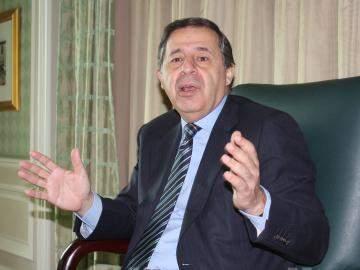 Former Industry and Trade Minister Rachid Mohamed Rachid, who fled the country during the 25 January uprising early last year, said Monday he is confident he will be acquitted of corruption charges and plans to return to Egypt soon.
Former Industry and Trade Minister Rachid Mohamed Rachid, who fled the country during the 25 January uprising early last year, said Monday he is confident he will be acquitted of corruption charges and plans to return to Egypt soon.
In a television interview on Monday, Rachid said the decision by Egypt’s public prosecutor to freeze his assets was due to a disagreement Rachid had with former President Hosni Mubarak. Rachid said he had refused to serve in the cabinet of former Prime Minister Ahmed Shafiq, which Mubarak appointed just days before his ouster in an attempt to placate widespread protests against his regime.
Rachid said the former president called him and spoke in an angry tone. "You will be in Shafiq's Cabinet, that's an order," Rachid recounted Mubarak telling him. Rachid said he rejected the command.
"He hung up furiously, and I felt something was going to happen. I decided to leave the country. Indeed, four days later, the freeze order was issued," Rachid said.
Rachid added that Mubarak rejected Rachid’s request to leave his post in 2010, telling him to wait until after the parliamentary elections later that year.
The former minister fled to Dubai during the 18-day uprising. In July later that year, he was convicted of squandering public funds and sentenced in absentia to five years in prison. He was also sentenced to another 15 years for granting illegal operating licenses to steel mogul and former Mubarak regime official Ahmed Ezz to operate his factories.
Rachid said in the Mondayinterview that he disagreed with Ezz on a political level, but had ordinary ties with him as a businessman. The former minister said he had established Egypt’s anti-monopoly agency to counter Ezz’s expanding economic influence.
Rachid noted that Mubarak never wanted the omnipresent corruption under his regime, stressing that the former president had never instructed land to be allocated or factories to be sold to favored officials. Rachid also pointed that corruption will not disappear as many believe, and urged the government to set measures to counter it.
The former minister said the Egyptian economy made a lot of progress in the past few years thanks to the implementation of economic development plans under Mubarak. He added that the revolution was not the result of an economic crisis, but rather a failure by the country’s leaders to honor their political promises.
The amount of public funds smuggled out of Egypt is not as large as is currently reported, Rachid said. “Such rumors cause problems for Egypt, and the next president should not delude the people by telling them those funds will be retrieved.”



